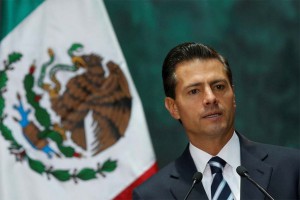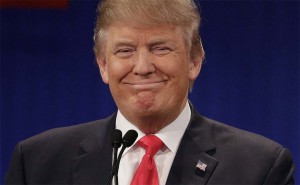Key officials in the government of Mexico say they expect to kick off formal talks on changes to the North American Free Trade Agreement, or NAFTA, beginning in May, following a 90-day consultation with the private sector companies from both sides of the U.S. Mexican border.
The NAFTA talks, however, could have already been scrambled by the release of transcript in which President Donald Trump apparently warned Mexican President Enrique Pena Nieto that he was prepared to use U.S. military forces to find “bad hombres” in Mexico.
President Trump threatened in a phone call with his Mexican counterpart to send U.S. troops to stop “bad hombres down there” unless the Mexican military does more to control them, according to an excerpt of a transcript of the conversation obtained by the Associated Press.
Trump also told Nieto the Mexican military hasn’t done enough to bring criminal gangs and others under control. The transcript did not contain Nieto’s response, AP said. The White House, meanwhile, denied the President made any such remarks.
The report of the conversation, however, has the potential to undermine the discussions about NAFTA, which the Trump Administration has identified as one of its top priorities. Mexicans are keenly sensitive to any threat of U.S. intervention in the country’s internal affairs
NAFTA also is of major interest to the global auto industry, which has made substantial investments in Mexico during the past decade. Mexico not only has cheap labor and free trade agreements with the U.S. and Canada, but also with countries throughout Central and South America, which help make it even more attractive to global carmakers.

Mexican Pres. Enrique Pena Nieto and members of his government are readying for talks to re-open NAFTA.
(Automakers look for options, weight costs under Trump. Click Here for the story.)
Trump also has threatened to impose a 20% “border tax” on products exported to the U.S. from Mexico. So far the Republican-controlled Congress has reacted coolly to the border tax proposal and carmakers are actively lobbying against any substantive change, led by Toyota Motor Co., which is urging its 1,500 dealers spread across every Congressional District in the U.S. to contact their Congressman and Senators to voice their opposition to the administration’s proposal.
European carmakers also have labeled the administration’s proposal, which is apparently still being drafted, as illegal and said they would challenge it before the World Trade Organization.
Japanese and European carmakers as well as Detroit’s automakers also have made large scale investment in Mexico in recent years and even Chinese carmakers are now eyeing investments in Mexico.
Trump has said he wants the next version of NAFTA to be a better deal for the U.S. interests. The downside of re-negotiating NAFTA is raising the risk of a major economic shock for Mexico, and U.S. food producers and shippers concerned about losing business.
Mexico’s government said consultations with industry would begin on Feb. 1, and continue after NAFTA talks begin, noting that the United States would hold a similar internal process.
(Trump threatens Canada, Mexico, with new border tariffs. Click Here for the story.)
Mexican officials also said formal negotiations between the United States, Canada and Mexico could not begin before May because of the consultations.
“Obviously, that’s the point where you need to draw up clear lines on what the main objectives will be,” Economy Minister Ildefonso Guajardo told Mexican television.
“At the end of these 90 days, the negotiation to update our free trade agreement will have to start,” President Nieto said in Mexico City at the presentation of a plan aimed at cutting red tape for Mexican business.
At the event, titled “Made in Mexico,” the government said that from March 1, federal agencies would now have to scrap two regulations for every new one they want to introduce, echoing an executive order signed by Trump last week.
Mexico sells around 80% of its exports to the United States, which has been the source of roughly half the foreign direct investment to Mexico in the last two decades.
(President Trump jumps on NAFTA before inaugural speech ends. For more, Click Here.)
The maneuvering also underscores the complexity of trade negotiations, which can cut across different sectors of the economy and involve dozens of companies with interest on one or both sides of the border. Trade negotiations, as the Mexicans to have suggested, are also notoriously slow and laborious, taking months and sometimes even years to complete.

